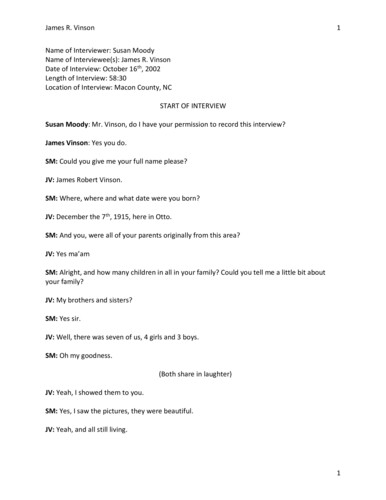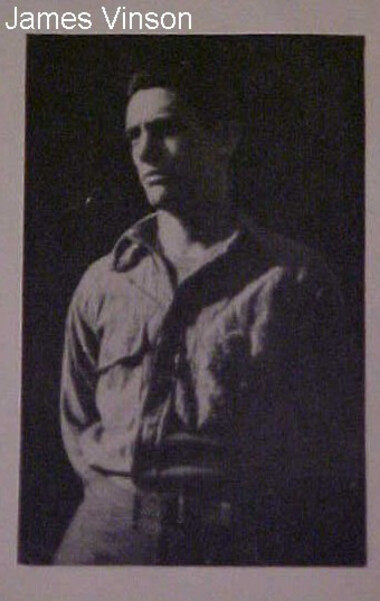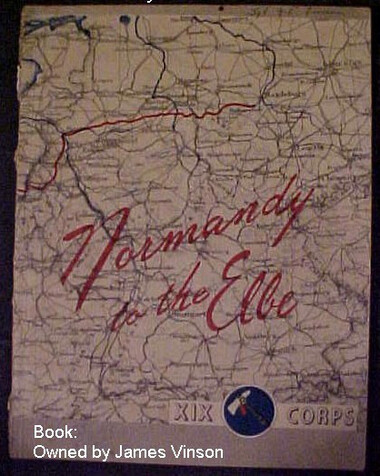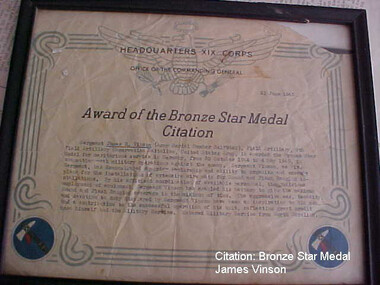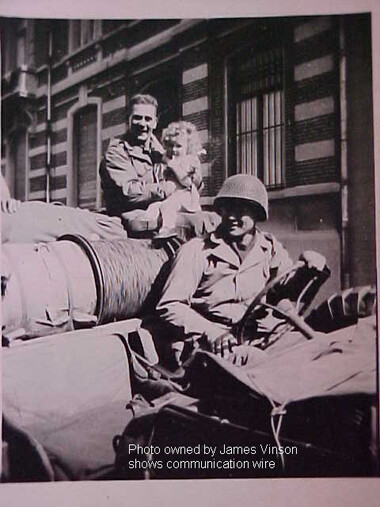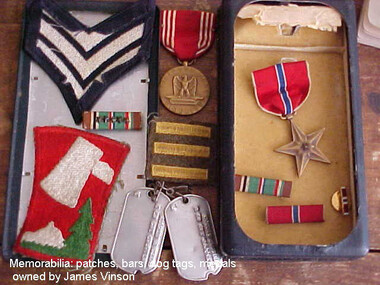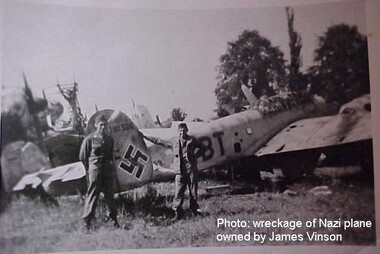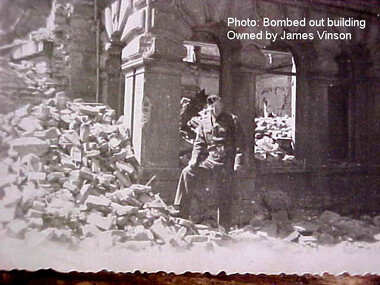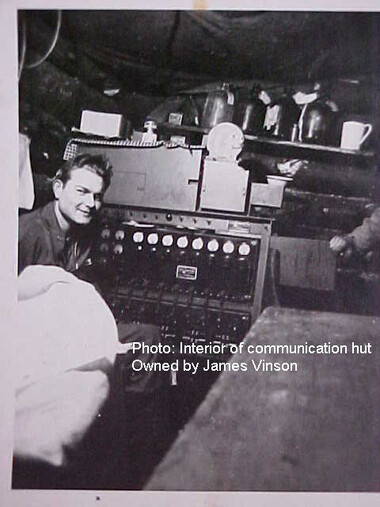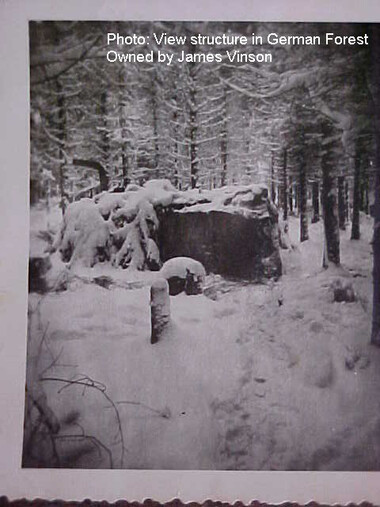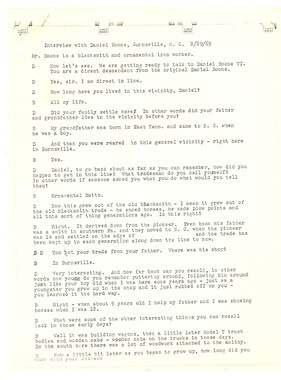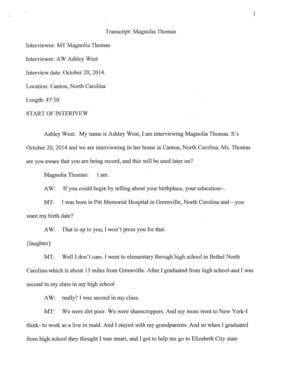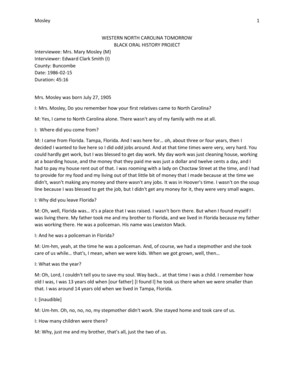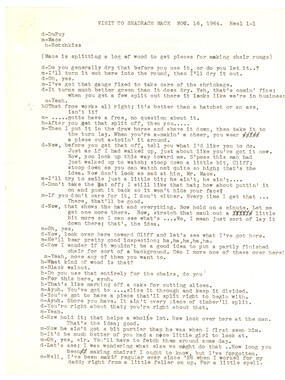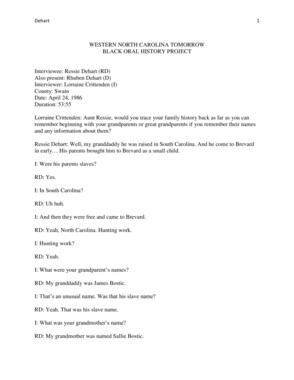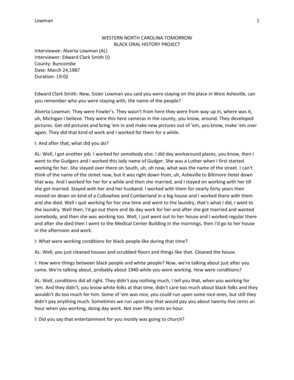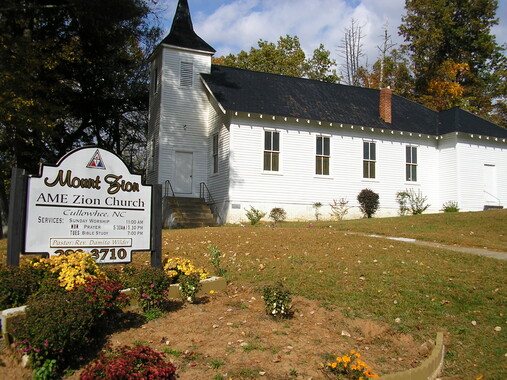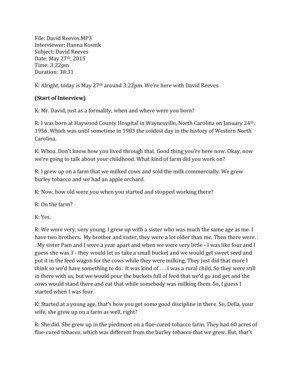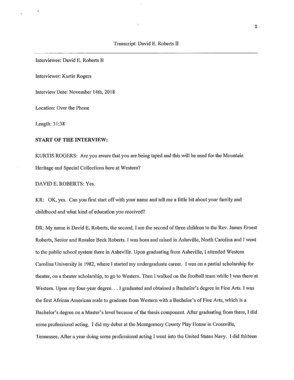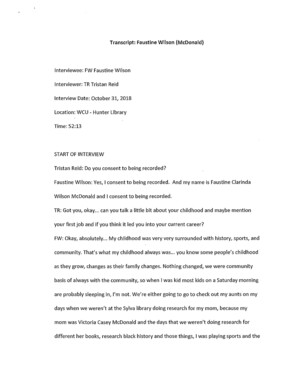Western Carolina University (20)
View all
- Canton Champion Fibre Company (2308)
- Cherokee Traditions (293)
- Civil War in Southern Appalachia (165)
- Craft Revival (1942)
- Great Smoky Mountains - A Park for America (2767)
- Highlights from Western Carolina University (430)
- Horace Kephart (941)
- Journeys Through Jackson (154)
- LGBTQIA+ Archive of Jackson County (24)
- Oral Histories of Western North Carolina (314)
- Picturing Appalachia (6772)
- Stories of Mountain Folk (413)
- Travel Western North Carolina (160)
- Western Carolina University Fine Art Museum Vitreograph Collection (129)
- Western Carolina University Herbarium (92)
- Western Carolina University: Making Memories (708)
- Western Carolina University Publications (2283)
- Western Carolina University Restricted Electronic Theses and Dissertations (146)
- Western North Carolina Regional Maps (71)
- World War II in Southern Appalachia (131)
University of North Carolina Asheville (6)
View all
- Allanstand Cottage Industries (62)
- Appalachian National Park Association (53)
- Bennett, Kelly, 1890-1974 (1388)
- Berry, Walter (76)
- Brasstown Carvers (40)
- Carver, George Washington, 1864?-1943 (26)
- Cathey, Joseph, 1803-1874 (1)
- Champion Fibre Company (233)
- Champion Paper and Fibre Company (297)
- Cherokee Indian Fair Association (16)
- Cherokee Language Program (22)
- Crowe, Amanda (40)
- Edmonston, Thomas Benton, 1842-1907 (7)
- Ensley, A. L. (Abraham Lincoln), 1865-1948 (275)
- Fromer, Irving Rhodes, 1913-1994 (70)
- George Butz (BFS 1907) (46)
- Goodrich, Frances Louisa (120)
- Grant, George Alexander, 1891-1964 (96)
- Heard, Marian Gladys (60)
- Kephart, Calvin, 1883-1969 (15)
- Kephart, Horace, 1862-1931 (313)
- Kephart, Laura, 1862-1954 (39)
- Laney, Gideon Thomas, 1889-1976 (439)
- Masa, George, 1881-1933 (61)
- McElhinney, William Julian, 1896-1953 (44)
- Niggli, Josephina, 1910-1983 (10)
- North Carolina Park Commission (105)
- Osborne, Kezia Stradley (9)
- Owens, Samuel Robert, 1918-1995 (11)
- Penland Weavers and Potters (36)
- Roberts, Vivienne (15)
- Roth, Albert, 1890-1974 (142)
- Schenck, Carl Alwin, 1868-1955 (1)
- Sherrill's Photography Studio (2565)
- Southern Highland Handicraft Guild (127)
- Southern Highlanders, Inc. (71)
- Stalcup, Jesse Bryson (46)
- Stearns, I. K. (213)
- Thompson, James Edward, 1880-1976 (226)
- United States. Indian Arts and Crafts Board (130)
- USFS (683)
- Vance, Zebulon Baird, 1830-1894 (1)
- Weaver, Zebulon, 1872-1948 (58)
- Western Carolina College (230)
- Western Carolina Teachers College (282)
- Western Carolina University (1794)
- Western Carolina University. Mountain Heritage Center (18)
- Whitman, Walt, 1819-1892 (10)
- Wilburn, Hiram Coleman, 1880-1967 (73)
- Williams, Isadora (3)
- Cain, Doreyl Ammons (0)
- Crittenden, Lorraine (0)
- Rhodes, Judy (0)
- Smith, Edward Clark (0)
- Appalachian Region, Southern (2393)
- Asheville (N.C.) (1887)
- Avery County (N.C.) (26)
- Blount County (Tenn.) (161)
- Buncombe County (N.C.) (1664)
- Cherokee County (N.C.) (283)
- Clay County (N.C.) (555)
- Graham County (N.C.) (233)
- Great Smoky Mountains National Park (N.C. and Tenn.) (478)
- Haywood County (N.C.) (3522)
- Henderson County (N.C.) (70)
- Jackson County (N.C.) (4692)
- Knox County (Tenn.) (25)
- Knoxville (Tenn.) (12)
- Lake Santeetlah (N.C.) (10)
- Macon County (N.C.) (420)
- Madison County (N.C.) (211)
- McDowell County (N.C.) (39)
- Mitchell County (N.C.) (132)
- Polk County (N.C.) (35)
- Qualla Boundary (981)
- Rutherford County (N.C.) (76)
- Swain County (N.C.) (2113)
- Transylvania County (N.C.) (247)
- Watauga County (N.C.) (12)
- Waynesville (N.C.) (68)
- Yancey County (N.C.) (72)
- Aerial Photographs (3)
- Aerial Views (60)
- Albums (books) (4)
- Articles (1)
- Artifacts (object Genre) (228)
- Biography (general Genre) (2)
- Cards (information Artifacts) (38)
- Clippings (information Artifacts) (191)
- Crafts (art Genres) (622)
- Depictions (visual Works) (21)
- Design Drawings (1)
- Drawings (visual Works) (184)
- Envelopes (73)
- Facsimiles (reproductions) (1)
- Fiction (general Genre) (4)
- Financial Records (12)
- Fliers (printed Matter) (67)
- Glass Plate Negatives (381)
- Guidebooks (2)
- Internegatives (10)
- Interviews (811)
- Land Surveys (102)
- Letters (correspondence) (1013)
- Manuscripts (documents) (619)
- Maps (documents) (159)
- Memorandums (25)
- Minutes (administrative Records) (59)
- Negatives (photographs) (5835)
- Newsletters (1285)
- Newspapers (2)
- Occupation Currency (1)
- Paintings (visual Works) (1)
- Pen And Ink Drawings (1)
- Periodicals (193)
- Personal Narratives (7)
- Photographs (12975)
- Plans (maps) (1)
- Poetry (6)
- Portraits (1663)
- Postcards (329)
- Programs (documents) (151)
- Publications (documents) (2237)
- Questionnaires (65)
- Scrapbooks (282)
- Sheet Music (1)
- Slides (photographs) (402)
- Sound Recordings (796)
- Specimens (92)
- Speeches (documents) (15)
- Tintypes (photographs) (8)
- Transcripts (322)
- Video Recordings (physical Artifacts) (23)
- Vitreographs (129)
- Text Messages (0)
- A.L. Ensley Collection (275)
- Appalachian Industrial School Records (7)
- Appalachian National Park Association Records (336)
- Axley-Meroney Collection (2)
- Bayard Wootten Photograph Collection (20)
- Bethel Rural Community Organization Collection (7)
- Blumer Collection (5)
- C.W. Slagle Collection (20)
- Canton Area Historical Museum (2110)
- Carlos C. Campbell Collection (282)
- Cataloochee History Project (65)
- Cherokee Studies Collection (4)
- Daisy Dame Photograph Album (5)
- Daniel Boone VI Collection (1)
- Doris Ulmann Photograph Collection (112)
- Elizabeth H. Lasley Collection (1)
- Elizabeth Woolworth Szold Fleharty Collection (4)
- Frank Fry Collection (95)
- George Masa Collection (173)
- Gideon Laney Collection (452)
- Hazel Scarborough Collection (2)
- Hiram C. Wilburn Papers (28)
- Historic Photographs Collection (236)
- Horace Kephart Collection (861)
- Humbard Collection (33)
- Hunter and Weaver Families Collection (1)
- I. D. Blumenthal Collection (4)
- Isadora Williams Collection (4)
- Jesse Bryson Stalcup Collection (47)
- Jim Thompson Collection (224)
- John B. Battle Collection (7)
- John C. Campbell Folk School Records (80)
- John Parris Collection (6)
- Judaculla Rock project (2)
- Kelly Bennett Collection (1407)
- Love Family Papers (11)
- Major Wiley Parris Civil War Letters (3)
- Map Collection (12)
- McFee-Misemer Civil War Letters (34)
- Mountain Heritage Center Collection (4)
- Norburn - Robertson - Thomson Families Collection (44)
- Pauline Hood Collection (7)
- Pre-Guild Collection (2)
- Qualla Arts and Crafts Mutual Collection (12)
- R.A. Romanes Collection (681)
- Rosser H. Taylor Collection (1)
- Samuel Robert Owens Collection (94)
- Sara Madison Collection (144)
- Sherrill Studio Photo Collection (2558)
- Smoky Mountains Hiking Club Collection (616)
- Stories of Mountain Folk - Radio Programs (374)
- The Reporter, Western Carolina University (510)
- Venoy and Elizabeth Reed Collection (16)
- WCU Gender and Sexuality Oral History Project (32)
- WCU Mountain Heritage Center Oral Histories (25)
- WCU Oral History Collection - Mountain People, Mountain Lives (71)
- WCU Students Newspapers Collection (1744)
- Western North Carolina Tomorrow Black Oral History Project (69)
- William Williams Stringfield Collection (2)
- Zebulon Weaver Collection (109)
- African Americans (390)
- Appalachian Trail (35)
- Artisans (521)
- Cherokee art (84)
- Cherokee artists -- North Carolina (10)
- Cherokee language (21)
- Cherokee pottery (101)
- Cherokee women (208)
- Church buildings (167)
- Civilian Conservation Corps (U.S.) (110)
- College student newspapers and periodicals (1830)
- Dams (103)
- Dance (1023)
- Education (222)
- Floods (61)
- Folk music (1015)
- Forced removal, 1813-1903 (2)
- Forest conservation (220)
- Forests and forestry (917)
- Gender nonconformity (4)
- Great Smoky Mountains National Park (N.C. and Tenn.) (154)
- Hunting (38)
- Landscape photography (10)
- Logging (103)
- Maps (84)
- Mines and mineral resources (8)
- North Carolina -- Maps (18)
- Paper industry (38)
- Postcards (255)
- Pottery (135)
- Railroad trains (71)
- Rural electrification -- North Carolina, Western (3)
- School integration -- Southern States (2)
- Segregation -- North Carolina, Western (5)
- Slavery (5)
- Sports (452)
- Storytelling (245)
- Waterfalls -- Great Smoky Mountains (N.C. and Tenn.) (66)
- Weaving -- Appalachian Region, Southern (280)
- Wood-carving -- Appalachian Region, Southern (328)
- World War, 1939-1945 (173)
Interview with James R. Vinson
Item
Item’s are ‘child’ level descriptions to ‘parent’ objects, (e.g. one page of a whole book).
-
-
James R. Vinson 1 1 Name of Interviewer: Susan Moody Name of Interviewee(s): James R. Vinson Date of Interview: October 16th, 2002 Length of Interview: 58:30 Location of Interview: Macon County, NC START OF INTERVIEW Susan Moody: Mr. Vinson, do I have your permission to record this interview? James Vinson: Yes you do. SM: Could you give me your full name please? JV: James Robert Vinson. SM: Where, where and what date were you born? JV: December the 7th, 1915, here in Otto. SM: And you, were all of your parents originally from this area? JV: Yes ma’am SM: Alright, and how many children in all in your family? Could you tell me a little bit about your family? JV: My brothers and sisters? SM: Yes sir. JV: Well, there was seven of us, 4 girls and 3 boys. SM: Oh my goodness. (Both share in laughter) JV: Yeah, I showed them to you. SM: Yes, I saw the pictures, they were beautiful. JV: Yeah, and all still living. James R. Vinson 2 2 SM: All still living. I had originally asked, were your parents originally from this area? Do you know how far back they went? From generations after living in this area? JV: Yeah, somewhat. My mother’s folks were one of the first settlers of Macon County. SM: Oh, very good. JV: Yeah, the Carson’s, I think the Carson’s were the names of the family in Macon county. The Carsons [inaudible] I don’t know when the Vinsons were to come in. But the thing is, we’ve been here a long time. SM: A long time (laughter). What did, what did your parents do for a living? JV: Well, my papa worked in the timber mill near Sylva [inaudible]. SM: Did they live here in Otto, or did they live in another town? JV: We moved out to Otto here in 70’ [inaudible] most of them are alive [inaudible], then we moved to Franklin till the war came on and they went to Baltimore to work on a [power plant] manufacturer up there during the war. SM: Oh okay. JV: Then we came home when I got out of the army. SM: Now when they were living in Franklin, and you said the war came on, did they advertise for people to come work in the factories, or were you living at home should I ask? JV: Yeah, and [inaudible] on my birthday you know, I went into the service, the 2nd of February then. SM: Okay, okay. JV: So I’ve been in the service a good while before they moved up there and went to Baltimore. SM: Okay, so you were already in the service and then they decided to go ahead and move up to Baltimore and they worked in the, JV: Airplane SM: Air, building airplanes and things building airplanes and things. JV: Well, now, my father did but my mother didn't, but my father did, and I had some sisters that worked up there too. James R. Vinson 3 3 SM: Oh really? JV: Mostly old family. SM: Oh okay, So that's what I was going to ask you to do. The or how many children were left in the family when they moved up to there? JV: Well there was...I guess there were the three of us, I guess. I mean, one of the girls was married. The other three girls at home and the three boys was in the service. SM: Okay. So all three of the boys were... JV: In the service. Well now, the youngest boy was still in college and I'm not [inaudible] to sit in high school. Soon as I got out of high school, he had to go up there. SM: Was He drafted? Is that why he said he couldn't go? JV: Yeah John, the brother younger than me. So he had volunteered about a year before the war come on. SM: Oh, okay. So he was already in the war? JV: And he was in the Pentagon, [He said that Darryl down doing the war] which all of these he went to Europe with the war over there. SM: When you were living with your parents, I know before the war, had you already gotten out of school and all and gone to work? JV: Oh yeah. SM: Where did you work in all in, in Franklin. Did you live in Franklin? JV: Yeah. SM: Okay. JV: Yeah, it was... it was back before I was in the service, I was working for the state with the bridge crew at that time. SM: With the bridge crew? JV: Yeah. SM: Oh, okay. James R. Vinson 4 4 JV: Yeah we was building bridges. SM: What did you do with the... In the [Big] Bridge? Construction? JV: We just built bridges, grow some streams, one thing or another, and painted them and repaint it, though if I had to repaint or anything like that, just anything there was to do with the bridges. SM: So, during the time that you were, had you married then? JV: No. No. SM: So you were just working and, living? JV: At home. JV: At home, you know, but I married during the war, I would come home [inaudible]. I was going to wait till after the war was over? SM: Well, let me, let me ask you, when, you were working as the war, as time came for them, for the United States to actually go into war, was... what kind of changes in the community did you see? In the area that you lived that, that preluded the war? Did you notice any? JV: Yeah there was a lot of things to do (laughter). SM: Yes, sir. JV: I don't know what (laughter). SM: Well, did you notice a lot of, you know, talk about the war and people more involved and things like that? JV: Yeah, and the boys was still coming home. SM: What do you, where did, what did you do for entertainment before you wait? While you were working on at home and all, how I mean, were their dances and things like that? JV: Oh yeah, we had dances, yeah, there wasn't much to do then, dances and stuff like that. We would go to the theater and junk like that, there wasn't much to do here in the mountains (laughter). SM: Were, were there many people that had telephones and things like that before the war? JV: Along the highways, yes (laughter) On the back side of the river like this. We never, we didn't get electricity here though after the war. James R. Vinson 5 5 SM: Oh really? Oh, okay. How did, what, what, what did you JV: The, well we got, well I guess during he war [inaudible]. SM: Okay. JV: Till the REA come in, well the Nantahala... We'd cross the river because the houses was long ways apart so normally no one here had any electricity, or phones or anything SM: Now the Nantahala, did you say what was that? The Electric Company? JV: Uh huh. SM: Okay. JV: They would set it up along the highway where there was a lot of those houses. (Laughter) SM: Oh, okay. Well, so when, as, as... did you have a radio or something that you listened to? JV: Yeah a battery radio. SM: Oh a battery radio! How did, was it like a big battery or? JV: I think it just run them off my car battery. SM: Oh, okay. So you, you were aware of the, the things happening.. JV: Oh yeah. SM: In the war… building up towards the war. JV: Yeah, we heard of them [inaudible] then on Sunday we heard it, and the time the British crew had a little camp down there, most of them stayed in the camp for the week [inaudible]. We had to buy our own groceries. You couldn't buy whatever you want, like he'd had to divide it among us. And the ones that stayed there, we, you know, that's all [inaudible]. SM: Oh, while you were working on the work crews? JV: Yes. [inaudible] on the weekends SM: Yes sir. James R. Vinson 6 6 JV: If I had known when I heard about it. I usually went back to camp on Sunday afternoon, so everybody didn't have cars here at that time (laughs) and [you'd either won't catch a ride] (laughs), SM: Oh okay, so y'all would, y'all would stay at the camp during the week while you were working and then go home on the... JV: On the weekend SM: On the weekends, but you had to, had to get rides as they came back? JV: Well I lived close enough to where {inaudible] I could walk back to camp, the folks here out in Franklin. [inaudible] Then just flip [inaudible] he's come back and mop this place in Franklin while before I got home. They stayed till I got out of the army we'd get out of the army and come back. SM: So you were at home when you heard it announced that they bombed Pearl Harbor over the radio. How did, how did that make you feel when you heard that on the radio? (laughter) JV: It kind of upset us all. Then, I don't know where we was are, I guess, when did President Roosevelt make the call? Yeah, it was... It on a Monday or Tuesday wasn't it. So we took one of the cars with [inaudible] and that radio, when we started listening, and you heard him declare war. SM: When the president came on? JV: Yeah we knew we'd all be in service pretty quick. February the 10th, [I had stayed in the states] two years to the day before [inaudible]. SM: Oh, okay. Well did... did you enlist or did you receive a draft notice? JV: No I had to. We all had to sign it and I guess I had done that [inaudible] SM: Oh okay. JV: Well ever since that happened, then we would be taking those boys to Fort Bragg for their flying examination. [inaudible] too much, and the center doctors [inaudible]. SM: Oh okay. JV: Got the, the seven counties around here and then we went over there to examine the seven border counties around Asheville. SM: Oh okay. James R. Vinson 7 7 JV: So you was, you was gone then? SM: Well, when you collect, when everybody, did y'all go in like a group over to the, to be inducted or in Asheville. JV: [inaudible] SM: Okay, so you were told to report to the bus and then bus they take you to Asheville. JV: Then I went to Fort Bragg and I had to go through, they had a bus to take us to Bragg for basic training right now, and 15% camp [inaudible] camp down there to go on a field trip or something. We had to go to Bragg. SM: Well, when, when you, when you got to bootcamp, um, how long did bootcamp last? JV: I don't remember exactly, I think it was about seven weeks. SM: So you stayed about seven weeks? JV: Well i'm not so certain about that, but it's something, then they called us out and signed us for [inaudible] SM: Well, when, when you were, when you got called out and they would, they would pick you out, did you have any option of where you want it to go? In other words, I just handed you... JV: They said that you would go do a certain thing and after you signed up, come down to you name [inaudible]. I left here with about 45 other boys, we took our training together. I never did see any one of them after that.. SM: You were... excuse me sir. I didn't hear your [facing] Battalion? JV: Yeah. SM: What battalion did you say? JV: 8th Field Observation Batallion. SM: 8th Field Observation I'm sorry, I didn't hear JV: [inaudible] SM: That was my fault. But, so, so you left the camp. They said, all right, we're going to send you to the 8th Field Observation Battalion and away you went. JV: Yeah. James R. Vinson 8 8 SM: Where did you, did you go in for special training then? JV: Yeah, we went in this training department. What we were doing overseas then, [inaudible] they gave you different things. [inaudible] We moved from Seton then to Jacksonville, Florida. [inaudible] camp just outside of Jacksonville, they sent me to communications school by myself for three month. Went out there, had a, they a [inaudible]. The boys went three years for that, and they gave us three months (laughter). SM: Crash course, huh? (laughs) JV: [inaudible] and you had a [inaudible] down along the [route] down there. You'd go down there and it'll be the next 24 hours or the next week. More books the brain, eight more paragraphs to study for that. SM: Oh, okay. So they put all the, your study information in your box that you to pull it out and learn it and get ready to. JV: Yeah. You had to be told what page to be on, what paragraph to write or read the first two months. Well we didn't have nothing to do and out in the field. SM: So that's where they kind of trained [Jeff] on actually on what you would be doing? JV: Yeah. And then they come back to you to see about maneuvers for about three months. SM: Now what's maneuvers? JV: You just sit out in the field for three months. SM: Oh, okay. Oh, okay. Okay. JV: [inaudible] see for that, I guess from for that. Then we went back, went back to Florida and then we moved into Oklahoma, and stayed there, then from Oklahoma we went overseas, up in New York. SM: Well when, when you, did you get your orders to like ship out when you left Oklahoma to go to New York or did they take you in a group or? JV: [inaudible] SM: Oh okay JV: I mean my whole battalion, [inaudible] took us up there for the 1st or 10th of February in 42 [inaudible] Yeah, the 10th of February of 44' they sent me on my first shift (laughter). James R. Vinson 9 9 SM: Oh, so they, they sent you over on a ship? JV: Oh yeah. SM: Yeah okay. And that was the first ship you had ever been on? JV: Well I've seen an ocean before that. (laughter) SM: Where did you arrive when you landed? JV: [inaudible] Scotland. SM: Scotland. Oh, okay. JV: And we got on a train there and we got off the ship and went to, to Bath. SM: Bath? JV: Bath, [inaudible]. Anyway.. SM: Okay. JV: We'd stay there and then we went overseas. SM: Well when you, could you tell me what... When, when you got into the areas where the battles were going on, what you did while you were there, you know, like when you woke up in the morning, what was an average day like? What, what kind of work did you do type of thing? JV: [inaudible] have to go each one of these [inaudible] bases. SM: Oh my gosh JV: They run a [black], then it would across up here and grab other stuff on the side, we would put when this way, then of course they hadn't ever worked back. The [place mat] and each one of the mics in the [inaudible] and it out in the front roll. [inaudible] getting back to headquarters, so we had won the war out. Man, there was only the four of us, three batteries, we needed to keep it up. SM: Okay, could you explain to me what a flash base was? JV: That's where the boys, someone up high would see something and see the guns, the enemy guns afar. Why won't it lights up the whole country? My big guns, like I say, [he's] out there. I mean, yeah, we had counselors, business seen the flash after him. He could talk to this mix, the two, you know, or the mood and then old look up and see that gun James R. Vinson 10 10 SM: So that way they could spot where it was, where the gun was firing. JV: Yeah, yeah. SM: Okay. Then you get your job would be to send the people out there to just take that gun out. JV: Yeah. SM: Oh, okay. JV: We would always look up to that gun outfit, which, well I had several guns back then, I would send that information back out there and then, then they had bar out there and listener either seat. Yeah you could see the explosions But anyhow, that's SM: they'd know as a [inaudible] where that big gun was, JV: they could give him worry of [snap with the did put a good mouthful. Learn this is accurate]. The one thing [inaudible] SM: Well, when you got into an area where you will doing this observation and and trying to get a lock on these guns as you destroyed them were you moving with... with your battalion or with a.. With an army group or something? JV: Well our battalion [inaudible]. SM: Okay. JV: There was this headquarter for equipment, and then as I am be bad or this, I mean there's this [inaudible] me and then in my battalion, I think. SM: In your, in your complete, so the communications part was a small part of the complete battalion were y'all at the front part of the battalions so that y'all would be doing this as the soldiers marched through. JV: Yeah. Oh yeah. Work right in the front line. They're obese or anything. SM: Oh my goodness. JV: It's going to speak Spanish, moreover is now, I mean I'm mostly what it is that by the way, our job is to speak up her equipment. It's kind of expensive. SM: They didn't want that for you. JV: Yeah, but we had in community they had the at a radio station. Yeah. For warm. So when I think of youth radio's had down in the war and that, I mean in my head, this survey party, that Demo survey born have worked on in the sound sampling flash and doing all this work. But I James R. Vinson 11 11 remember it was in [inaudible] SM: You've been mentioning an OP, what does that OP stand for? Operation or something? JV: That's a [inaudible]. SM: Oh, okay. So they were the ones that were out there that will do in the triangulation and putting up the, JV: {there's one listening for the enemy guns to fire either watch [inaudible]}. SM: So that's what, that's what they're all called. JV: Yeah SM: Well, as you, as you moved through the area, what areas did you travel through? What places were you, you showed me a map of all the, that you would, once you got into the battles, you don't him. You told me that you've landed on him and he came over and were in France, when you were traveling through France. Do you remember any of the places that you were? JV: {any out]? I went, we went through [St Lo once]. SM: Oh, okay. JV: Yeah, I guess it, I don't think there's a building standing there. We went. We can see Paris, Parris [inaudible]. Paris, we went through, but we didn't go to Paris. I don't know [inaudible]. SM: Oh, okay. All right. Well you had showed me a little earlier. Your Battle Star., JV: Yeah. SM: There were five stars on it. And you told me that each one of those represented a battle. JV: Yeah. SM: Okay. Said, oh, open it up for you. JV: There is Paris there. SM: Yeah. JV: Well you see we had served [inaudible]. I imagine [inaudible] It was, but I guess it's when you [inaudible] so far, and I don't know where the next one was. SM: So each one of these little places represents a battle that, that you've gotten a star in? James R. Vinson 12 12 JV: Yeah. SM: Okay. JV: So I used to [move] the name and the last lesson I guess was on that board. The Germans that didn't make the last, or had to make their last stand. SM: So this was the place where the... JV: Anyhow, on this map, we went through five of the major battles. SM: Oh okay. Well, as, as you moved through the area, you were telling me that you showed me a picture of your little, the snow and all was covered. Could you tell me about that little building and all that, that y'all were staying here. JV: Well there was this room you had to crawl though (laughter) the outfit, been there before that took those, that took those [inaudible] six foot wide and six foot holding her and sleep and a new set up and that you couldn't stand it for anything. SM: Oh, okay. JV: So we just put a piece of flat [inaudible] down on the ground and you had your sleeping bag. So then [inaudible], and we had the lieutenants is over. So he stayed in that [little hut] with, so we hadn't relied in there. He could done, he had the sense of the later, you know, stamping. SM: Oh yeah, but they had to censor mail over there? JV: Oh yeah, the boys were writing home. SM: Oh, okay. JV: He had to, he had to be sure they wasn't a [inaudible] in anything that is, he's supposed to, he had the [century]. SM: Oh, okay. JV: There [were these initiatives on] me. Yeah. So he asked, what are you doing with [a knife]? He just had the [bluecat] and [Arista] and these [inaudible] (laughter), nobody wouldn't afraid to send with boys, but it's just our section that he had to do that dude, he had did this one and [inaudible]. SM: Oh, okay. So you were, you were [sealing with (inaudible)]. Is He, this is, what area did you tell me? This little, this little a house that's all had built up in? JV: The Hurtgen forest. James R. Vinson 13 13 SM: The Hurtgen forest, Okay. JV: We went, we went up there on the second of the sandbar thinking is, we'll live, where was Andy is long ways. When was that them to appear. And when we get into the American parks, snow, snow on the ground all the time was up there. SM: Oh really? How do, I mean pretty deep snow, right? JV: Six, seven, eight (inches or feet?). SM: Oh okay. Well tell me about the electric lights you had in your, um, in your house there. JV: Well, [same central]. I had to have, they had a generator and they didn't. [Wars are growing place and maybe] if you wanted to light in your, in your blockade told or what have you, then why don't you [inaudible]. I didn't warn you had lacks some of the boulders up in the little hearken into a hardware store up in the Hurtgen forest and they picked us up a bunch of lights hooked in to put it up in hours and we're to have little lap dispatch side of that. SM: Good. Oh, okay. JV: Pick this up. Some little stones. It wasn't very big. And then they let him go back to the minds and get it out of our old timers there. SM: But you were telling me about the, you had to put the what? What was that as the blankets you were telling me? JV: But yeah, cause you'd pick, you could pick [inaudible] anymore. Oh Globes. Anyhow, the blanks I think is already over and so we did that. That was important to raise this and they'll be in here and laid it down. Then it gets it where you had the latch, you had to keep, keep it covered over. You were telling me people down. SM: That was to keep people from being able to spot where you, JV: The Germans if they've got, if they seen the plane or something. It didn't see that. Oh okay. Okay. I'm just to keep safety. SM: And you were, you were telling me about this, this was the radio command. JV: Oh yeah. That is. [inaudible] don't know if the sound comes over…over those things. And it's just like pulling up a rock out in the lake and the waves are coming at, you know, and that's the way it sound moves and music crossover that they could do somehow with the machine. Your stuff, they could get to come out on the tape like you're saying your place. Do you brand yourself more than me? SM: Yeah, a little a sign that's kind of, oh that's true. [Clock here]. James R. Vinson 14 14 SM: Sorry. I thought my machine [inaudible] JV: that the, but that's it. That's what they were doing. SM: So you would go out and put out the sounding things? Yeah. And then there it would be transmitted back to this, did this place, JV: yeah, there's a war coming back to it. And then these other things as well. It's about that big around and it's about that long I guess. And you put them down in or put them in a rubber boot and then you had to dig a hole and you had a big canvas saying and you could hook gets that down in the hole and they stayed in the hole. But there's a war going back to Samsung Front of each one of them. SM: Okay. And then what with the sound coming over those sensors, they could tell where the big, the enemies guns were shooting from and all? JV: Yeah. SM: Oh, okay. JV: Yeah. There's one that will be used first. When we first hit France, they pick you up to 25 miles away and we didn't a thing to shoot back at him. They sent some plans. SM: Oh, okay. So they were pretty accurate that if they picked up guns 25 miles away, JV: Most of the time. SM: Well, when, as the war was coming to an end, do you remember where you were when you, could you tell me what you, what was… JV: We got was this [inaudible] we're waiting on the Russians, Germany and they let, they let me just stay depression, sad little bunch of the school back then some of us go back to your vacation [inaudible] you got three days and would through this. But her name's Matt. My name. Huh. SM: Oh, so you got to leave? JV: Yeah. SM: All right. And do you ever, do you ever say extra day then? JV: So I had four days and nights and days went back on your state? No, but we had to walk I guess about a quarter of a mile down the cafe de and which is American food with the girls waited donors. That's what it told us. The tips for the way is that okay. Oh reasonably campuses are using the trains and all that to bring a rich woman. The Germans prisoners talk to northeastern and bring it to where were, these are our boys that they were bringing out of the James R. Vinson 15 15 prisoner of war camp. SM: What was the distance when the Germans had down a hall and branch? JV: [inaudible] SM: So they were bringing the, using the trains to bring them back through Paris? JV: Yeah while they were using the the stuff and yeah, complain too much. SM: Well you had told me, and I meant to ask you this before we do that, during the time you were in the army on leave, that that's when you married your wife and all. Did you have an opportunity to come back over to the United States while the war was going on? So how did, could you tell me how y'all got married then? I mean, did she come over there? JV: No, I come home on a furlough. SM: Okay. JV: I've got the six and one of the merger. SM: Oh, okay. So you, you got married. Good for you actually went overseas. Oh, okay. Where did you meet your wife? JV: I met her, [inaudible], SM: So, so she was from this area too? JV: Well, she lived here at this, this is this place. SM: Oh, okay. JV: So this is her family's farm. SM: Oh, okay. Well did y'all go to school together and all that? JV: No. In fact, the smell good Marlow were on me. He went same church together and all that stuff. And they, they used to have dentures. The home, one thing, they had a lot of banks this year. Her Dad is, he is, he is a laid the Fed. We're mostly me out and mostly [inaudible] family could make music and making music and maybe have a nice squared ancient. SM: Oh, I don't know where… you haven't been to one or… JV: no, no, I've never been a dad. I mean I've heard of them talking about square dancing, but I've been homeless back then. [inaudible]. James R. Vinson 16 16 SM: So you met your wife, uh, from, from the area and you were transferred to bootcamp at all. You corresponded with her back and forth? Yeah. Wrote to her. And then y'all decided to, where were y'all married? JV: Here in Otto. Clayton. SM: Okay. JV: Yeah, that's [inaudible] SM: When after you married, did she stay here at the family home while you went back into the army? JV: What'd she say to my mother, most father lived here and my brother was there and she stayed with Mathilde smokes. Hello. And she went to Baltimore with, [inaudible]. SM: Oh, did she work in the plants up there? JV: Yeah. SM: Oh, okay. JV: So the whole family did go up there and work. We're all one. SM: So you never did get to come back home while you were in the overseas. Oh, okay. So when they left, um, when you, uh, they decided, can you tell me about when they decided to let you come on back home? JV: After the war was over? SM: Yeah. JV: Listen, we started training for the city. SM: Oh, okay. JV: And depending on when this is over then why they went by the Orange Ga. Oh, okay. SM: Now the points were how did, how did they [inaudible]. JV: So many years of service and uh, he got wounded or something. Why so many in this? Things like that. And so the ones that had enough points, they let them come home. SM: Oh, okay. JV: I don't know. We started back then know there's a good wall before we got to come home. James R. Vinson 17 17 But anyhow, I come back on the Queen, the list really? That was next to the biggest queen. Marie is the biggest back then. You know, we marine Wayne, Maria, I say. Yeah, it was the largest call I come back home waiting to live with. This was before he married this three or four feet and over near them. So we come back in four days and then going over, it took a stark thing, days mass to go. SM: Oh my one one took so long to go. And so for short to get back, JV: they come back, but there the ship come back. We just sat there going, there's a convoy and go out on deck and everywhere you look there's ships and they could go, could go if I should have been slow ship. SM: Oh, so y'all went over in convoy? JV: Oh yeah. SM: Oh, okay. SM: Were you ever way you look and then they have little destroyers and in and out between chips to mutation or something with you? JV: Both. SM: Oh, so they were running[inaudible]. JV: The garden, usually we're going over. SM: Okay. So that slowed everybody down. JV: Yeah, and we went with the northern route to do more than that. But in the end, that song and the, I was on shift 13 days, come back faster. SM: Getting back where, where did you come into New York? JV: Well we went out. Put the deck is over in, yeah, New Jersey. Whereas discharged from that they live, I got to go home for the discharge. SM: Oh, okay. So you came in and they just let you go on right at home JV: and the day or two, then they're just wrong. And then we had the evacuees certain times those, my brother wrote me back and he had killed ready to go on over there and then they kind of knew what time would you want to do that? So he's back the to think. SM: Oh, okay. Well you had told me that that three of your brothers had um, gone. He and three of us had gone and want, had gone in a little earlier. James R. Vinson 18 18 JV: Yeah. Yeah. Many about a year sign, one game. You went in and volunteer for it. SM: Well, so when your brother came and picked you up, you came back to this area, JV: Well we come back. Then my folks is in Baltimore and I come back up [inaudible] yeah. SM: So when you got, when you got out of the army, your, your, your parents were still in Baltimore and you went there already. JV: He's already come home. Oh, well, okay. He beat that. The end of the boy. He's a good one. I don't know. Named Damien, I think it is. I think it might be, yes. SM: So you stayed there just a little while? JV: Yeah, SM: I guess he's up there about some bad a week. I got to go home and sleep or something. SM: Well, when you got completely out of the army and they discharged you, what did she do? JV: We come back home. SM: You went, you went back to your parents at Baltimore or you came back here? I went to them and we all moved back. Oh, the whole family came back. Okay. JV: Oh yeah. They didn't have to replace in everything they do. I got out up there and we'll come back and move back and I think we received that week except John and he had murdered these state debt. That was one of our brothers and the other boy is six months or something like that later. He got it. He was, he hadn't been in as long as well SM: You came back to this area right here around Otto, or Franklin? JV: Franklin. SM: Oh, okay. You can then embody it and written to move [inaudible] When, when your whole family came back, what? What was everybody doing? I mean, where did you work and your parents work? JV: No, I reckon we just, we just started getting [timid] again. We'll add in different jobs sometimes out of timbers. I do something else back then when day I'm working with leaks and stuff. We got the most. And then when you're ready, [the likes in South Carolina]. SM: Oh, okay. Okay. JV: We moved to Durham. James R. Vinson 19 19 SM: Say, did your wife go with you then when you were working over there? JV: She stayed when I come back to, uh, I guess it wasn't long. I went back to won't me a truck and started to holding go cigarette hardwood film. Did you rank and you know they both [told her] and everything and they bought all the timber and Georgie with lakes down there started holding the load for the people. I started cigarettes over there, man. Man. Thank you. They sold or anything younger brother [inaudible] he got sick and died. SM: So your dad owned a sawmill? JV: Oh yeah. SM: Oh, okay. JV: Yeah, sure. I capture that five years ago. Got worried he'd done the song or not in the Logan rather than the timber cut. SM: Oh, okay. So your dad got sick and couldn't work anymore? Did he started calling him to work? JV: [inaudible] clearing land and things. SM: You were out of here? JV: They ain't many places. I'm not work somewhere to make a place where you could build your house and all. SM: Okay. JV: Yeah, that's a lot of work involved in that and… SM: Oh okay. JV: Yeah, they just didn't, again, I guess him shoulder goes down. That's when I went to work for demo in the legs and want to come back. I'm going to be an issue for him, man. Then he moves on me and it's all great. SM: So Sarah was one of your children? JV: Yes. SM: You told me you had? JV: Yeah she's the middle and she's a nurse. SM: Oh, okay. So you had six children in, in your, your family? James R. Vinson 20 20 JV: Yeah. SM: Okay. JV: [We would visit her]. The other two girls are teachers and three boys. [Those] teachers are younger. Smaller. He'd be, yes. SM: Oh, okay. You just had to move back to Florida then of course, to this lady you told me she stayed that Sarah… JV: she's lives there and one of them lives in Clayton, Georgia. SM: Not too far from here. JV: She can learn or, yeah, it's your [she-inaudible] graduate and her, I've been married, she married even. He had to tear the boy and a girl and the girl was married and no, she's married. One of her daughters is married now. We've got this then boy. SM: Oh, okay. JV: Or great ground. SM: So stay up, stay up. And it'd be, he'd be like, great, great, great, great grandson. JV: That's true. That's true. Yeah. I've got more patient and nurse and worked in construction. JV: [Nice to be nice to bill was over the bit worn down there]. That's going down toward from city from Dillsboro. [inaudible] JV: Yes. Between Bryson City and the BLP. SM: Well when you got that from, uh, the service in it and your family moved back to this area, can you tell me, did you notice any changes in the area when you came back? JV: Yeah. This restaurant is changes.[inaudible], SM: So they'd already got the lights on this side of the… JV: Yeah. Everybody [inaudible] house regardless of where you live. SM: A normal life James R. Vinson 21 21 JV: They did a lot of the boys that went over, um, returned back to the area. I think that people that you knew were already here. SM: Yes. JV: Yeah. You know what I'm saying about them, but they got back or, but there was a good deal of people coming back to that. SM: Most of them working in the same type of businesses and stuff. JV: Well, we'll just different jobs, you know, there's a lot of time they want me to come back to the ridge, prove it. And then, [inaudible] SM: And as we kind of get to the end of our whole talk I need, I would like to, I'd like to ask [Jean], is there anything about the community or your wife after the war of that you'd like to tell me that maybe I haven't asked you about that, that you think might be important for this interview? Is there, was there anything in general that maybe I'd overlooked? Or are you thought, well, you know, I really need to know about this? JV: No. SM: Okay. Okay. JV: Uh, when I think about it, that's okay. You come, I'll call you back. But um, well mine is not as good as it used to be asked you about. SM: What… when you got ready to retire and stop working in the lobby and all, did you, you and your wife lived in this house then? This is where you said she, she, …. JV: yeah. No, we didn't live here. In fact, when I worked in Jordan, I mean, unless they don't move lights and Jordan about seven year old in Georgia. Yeah, I had a, I had camps and she cooked in the camp for the man. SM: Oh, okay. So your wife was, was working with the, the, um, now what company was that? JV: We did the last [inaudible] [inaudible] JV: Yeah. I had a bad meal here. Franklin, the silver band, man, it is make floor now. Will it cigarettes don't make it full on. I think they sent it out. Guess they got medium to feet on depot street down there alone there. In fact, I guess this is one of the biggest porn we'll have in the movie where the main floor in the United States, oh gosh, gosh, they haven't been, how many acres of land down on, it's covered up a big stacks SM: So that this is hardwood lumber then they're dealing with, okay, so they would send the James R. Vinson 22 22 crews out to cut and harvest the timber and you bring it, you were working on doing that and your wife was working with the, as part of the gang of not the cooking for the gangs. JV: We had a Vander a timber and they, they just gave me so much to cut it, to log it and deliver it to their meal. SM: Oh, okay. Okay. SM: So you were kind of independent. JV: Oh yeah. SM: Yeah. Did y'all tell your children with you when, when you were doing this? JV: Yeah. All except the last two. SM: Oh, okay. JV: Yeah. We had to really come. They build things and he made him a 16 foot long, eight foot wide and the [inaudible] and we put two together, made the kitchen and we had ours.[inaudible]. They had 2.6 is on the bottom of that and I can take the dozer ratio [inaudible] [scotch?] it back of truck or go. Well then they can slide it on the truck and move it anywhere. I wanted to go. SM: Oh, okay. So you took your house with you. Oh, okay. JV: Well of course we didn’t, just had a wood cook stove. No. To do this, take it down off his legs and set it down on the floor when you got your bed is already made up. SM: My goodness. So you take, you took one, one to make the bedroom at all and then went to make the cook house and, and so you would have two, but you just take with you when you went to wherever else you were gonna go? JV: We took all five of us. I had two for the man to do together. They slipped up together and we had a little hallway between, well I didn’t really pay much attention. SM: Yes, sir. JV: I had one. This us setting up somewhere so… SM: well you took your whole little, a whole community with you to travel did (laughter). JV: So we would move him. I can [inaudible]. ell did any of your children as they were growing up, before they actually got out and started working at work for the lumber company too? They all went directly somewhere else. JV: (laughter) Yeah. Yeah. They, the second boy, the little boy. James R. Vinson 23 23 SM: Yes sir JV: I tried to get him to learn to run the dozer. SM: Yes sir. JV: What are you back then [inaudible] went up to Highland [inaudible]? Yes sir. A caddy, okay. Oh boy, I don't remember whether it is he this, the book warm. Oh yes. This here is the youngest one? The one in the middle and on the far side. He's been your younger women. There's been your younger than the baby girl. SM: Oh, okay. So he really is the baby, oh, okay. JV: Yeah. That might be [inaudible]. SM: Well it’s, it’s, over the years since you've lived in this area, from the time that you were born until now, what can you give me an idea of how you've seen the community grow and change? JV: [inaudible] There's a house now. It used to be a house here [inaudible] or remodel of an x and now there's relaxed in that band when it, then in my front yard and, I guess 25 or 30 houses inside and back. Back then by one or two loading. See you back here on that Ridge. Turned an old print. This road, this before we get out there. Go after these five or six hours out in, there wasn't any houses at all that in there. There's one right down. Then we got down here. Oh, it was built down. My report will be a [inaudible] for the updates in here. No one, no, I hadn't either. Show me one near everything. I've grabbed me this house, we sold it. SM: Oh, okay. So everything, all the ones that's in here. You, you, you cut and build, well golly. JV: We had a planner. We planned it mostly. Yeah, in here. Of course. I never finished it. SM: Oh, that's very nice. Very nice. It's nice and warm and comfy. JV: I guess it [were boys here] and I had a bunch of maybe more involved and they haven't done our best secure. And we had a planner. So without playing in Denver, put it down. So this is maple [cork].Oh no that’s oak. SM: Oh, okay. JV: So I'll put that maple down and it hadn't been tilled right and I had a big hole sawed in it and it cracks [laughter-inaudible] SM: Oh, okay (laughter) James R. Vinson 24 24 JV: So, [inaudible] I put this on this [inaudible]. SM: That's a good solid floor isn’t it? (laughter) JV: I’ve got, gotten the back side of the house. More, more it and then the board on me, it still got the front, the back here. I mean that, that side over though [inaudible],my grandson is in the army and he's coming home pretty quick, so I'm having a big supper. SM: Fix it up then. JV: He, he's the one that put it on the other side. SM: Well, as we get ready to close here, let me ask you, how do you think service in the army changed your life? JV: [inaudible] SM: You say, if anything would have been different if you hadn't been in the army? JV: [Enrolling?]. SM: [inaudible] oh okay (laughter) SM: Well, I'm going, I'm gonna get ready to shut off the tape. Before I do, I want to thank you so very much for taking the time. You've provided me with some wonderful information and I've enjoyed talking with you. So, I'm going to shut the tape off now. If I can find the button.
Object
Object’s are ‘parent’ level descriptions to ‘children’ items, (e.g. a book with pages).
-
Susan Moody interviews James R. Vinson on October 16, 2002. James Robert Vinson, a local World War II veteran, served in many famous battles in Germany, such as the Battle of Hurtgen Forest (September 19, 1994 - December 16, 1944). During this interview in Otto, North Carolina, Vinson reflects on his years growing up, serving in the military and meeting people from different cultures. Includes additional photographs of Vinson in uniform, the military, and Vinson's award called the Bronze Star Medal citation.
-
